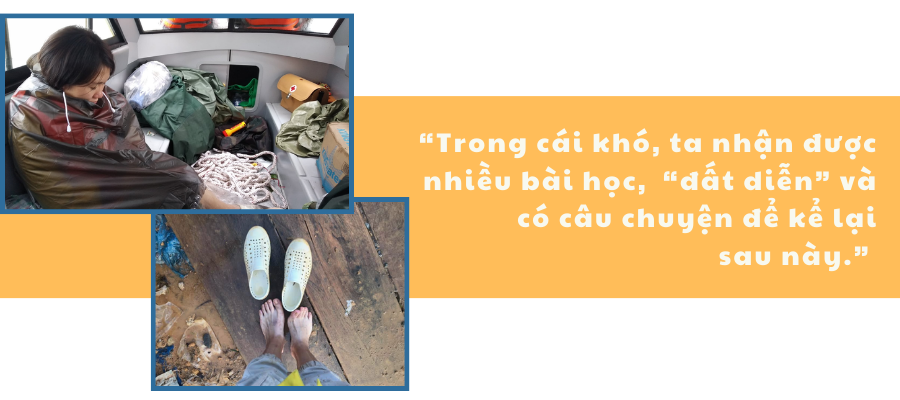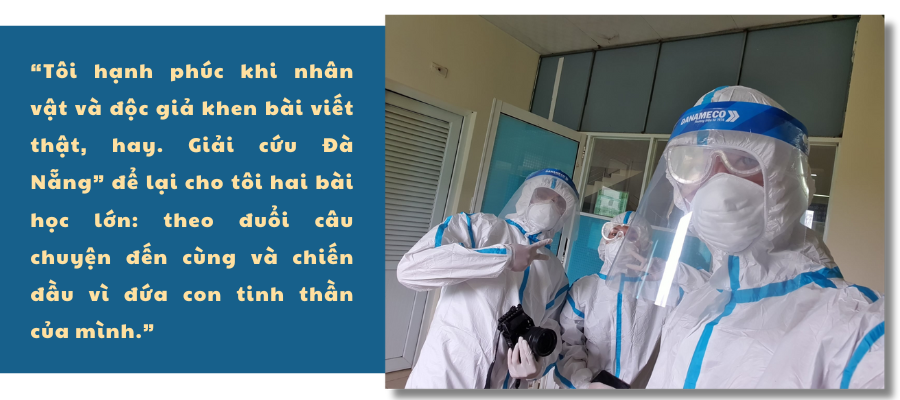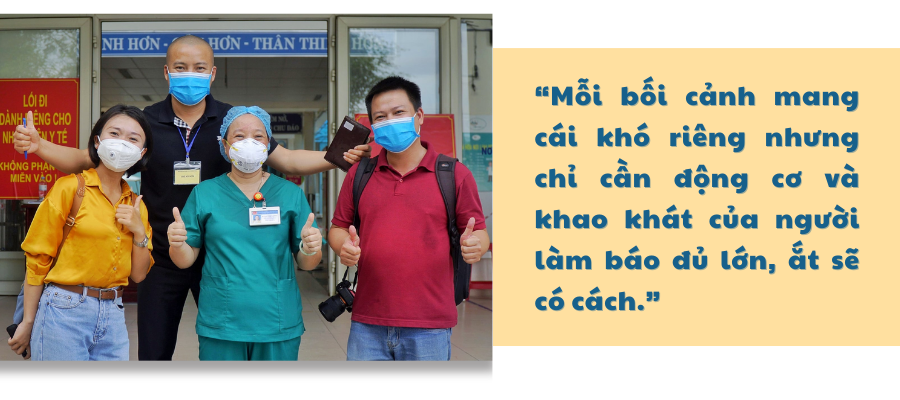
Covering storms and floods in the Central region, and spending 45 days in the epicenter of the epidemic in Da Nang, are two unforgettable missions for young reporter Nguyen Thu Hang, a former student of K58 of the Institute of Journalism and Communication. There was a trip that began with an unexpected directive, a few hours of preparation right after receiving the assignment, and an undetermined return date. Hang's backpack was filled with the desire to bring readers the most authentic stories from every land she set foot on.
For the next generation of students of the Institute of Journalism and Communication, Ms. Hang is a "senior" in the profession that we often follow to learn. We had the opportunity to talk with her about the challenging journey of a young reporter.

Having worked with Tuoi Tre newspaper since her third year of university, Thu Hang realized that she did not have enough experience to fight for the long term in this profession, or in her own words, “was still very ignorant”. After graduating, she decided to temporarily stop working as a journalist and work for a non-governmental organization. After 2 years, Hang returned to journalism when she felt more confident. She chose to go to Ho Chi Minh City to start over from zero with the hope of having a new perspective on work and life.
“For me, the most important thing before the changes is careful preparation. When I decided to move to Saigon, I was worried about both the living environment and starting over with journalism. But I was confident because I had prepared for myself a set of rules to know what to do and what not to do. I spent time learning about the weather in Saigon, reading a lot about the people of the South, trying to understand the knots in their cultural life over the past few decades. Thanks to that, the adaptation process was smoother,” Hang said.
Having been in the South for 4 years and working for two press agencies, Thu Hang considers each move as a new train ride and must clearly determine where she wants to go.

The period 2020 - 2021 marked Thu Hang's maturity through months of persistent work on hot news events. Continuous storms, lurking landslides, scabies from wading through water for kilometers, high risk of Covid-19 infection... could not stop the young reporter. She cherished each trip and volunteered many times to go to the hottest spots. Once, when she received a notice to return to the office, Hang felt regretful because she was afraid of missing out on information.
“Sometimes when I’m tired, I also complain: Why do you have to suffer like this, Hang? But the thought of stopping has never appeared in my mind. There is no extraordinary willpower or secret to those difficult situations, I just “crawl” through them. Just overcome each challenge, solve each problem, and everything will fall into place. In the midst of difficulties, you will receive many lessons, have a “stage” and a story to tell later.”

One of the stories that Hang is always proud to mention is the journey to write “Rescue Da Nang” – an article that recreates the portraits of soldiers fighting Covid-19 in the epicenter of Da Nang. The idea for the article started when she accidentally chatted with a member of the medical team that helped Da Nang Hospital. The way they built a strategy to help the city escape the tense pandemic reminded Hang of the deployment of troops on a fierce battlefield.
On her personal Facebook, Hang mentioned that Rescue Da Nang was her most difficult product to make, like picking up bread crumbs. It only took her 1-2 days to visualize the article, but the time to follow the story was many times longer. The planned interview list included more than 20 characters, but she approached and interviewed 13 people. In the end, Hang could only include a few characters in the article, from 120 carefully extracted pages to a 6,000-word manuscript. When the editorial board asked her to shorten it to 3,000 words, Hang shed tears because she felt sorry to leave out any word, and to cut any detail. "The bosses suggested changing some words because they were rough, but they were necessary for the article to be real. With Rescue Da Nang, I had to fight to protect every word I wrote. When the article was published, both readers and the doctors and nurses I interviewed praised the article and sent their thanks to me." - Hang shared.

Interviewing 13 people who directly participated in that fierce battle was not easy. In response to my curiosity about how to approach and exploit information from the characters in the context of natural disasters and epidemics, Thu Hang shared:
“With natural disasters and epidemics, reporters being present at the scene, caring and sharing will easily gain sympathy from the people, so approaching the characters is not difficult. The difficulty is finding the characters and emotional stories amidst much pain and loss."
In the case of the Da Nang epidemic, I encountered more obstacles due to the health status and busy work schedule of the subjects. Reporters were forced to wait and take advantage of opportunities. Many times I waited for subjects in front of the hospital for hours because they themselves did not know when their shift would end. The doctors and nurses had to take advantage of every minute of rest, so we reporters did not want to bother them for long.
With important people and politicians, an effective way is to show up slowly and continuously so that they become familiar with you, and from familiarity to trust. In addition, you can contact them through relevant channels. I interviewed former Deputy Minister Nguyen Truong Son through the Ministry of Health's media team during the tense epidemic period."

To get real articles and images in the newspaper, reporters like Thu Hang may have to walk and wade through mud for kilometers, stay at hospitals for many days and hours despite the high risk of exposure, etc. When asked about difficulties, Hang always answers optimistically, without hesitation. What worries her the most on those business trips is "whether she misses anything", "whether she disturbs the rare rest time of the characters or not".
When asked about the disadvantages and difficulties of being a female reporter, Hang shared: “Not only is there no disadvantage, but there are also many advantages. Of course, women have to face some problems such as poor health, difficulty protecting themselves from the bad intentions of the opposite sex,... but I guess male colleagues also have their own disadvantages. Women want to be firm, be firm, and be soft. In some cases, a female reporter will have an easier time accessing news sources than a male reporter. For example, in the midst of a storm or flood, the gentleness and affection of a female reporter helps the character to open up easily. Women are also cared for a lot by people around them during their trips.” – Hang shared.

In charge of many important and complex fields, Thu Hang always maintains the rule of telling stories as truthfully, quickly and comprehensively as possible. She especially emphasizes creating products that are discovery and creative to increase attraction.
When mentioning the challenges that journalism faces such as artificial intelligence, declining public opinion, and competition with social networks, Thu Hang affirmed that reporters will not survive in the profession for long if they only know how to make simple products.
“AI can now write news quickly, but I think that for at least 5-10 years, it will not be able to write in-depth articles or create products as creative as a real journalist. Therefore, in order to not be replaced, the first thing is to get rid of the idea that journalism is just for writing news. Reporters and journalists need to be less easygoing, adapt to technology and correct product defects. Technology creates the appearance of too many new things, readers are becoming more and more demanding."

According to Thu Hang, to do this, journalists and reporters should equip themselves with new skill sets beyond simple filming, photography, and writing. She is pursuing the trend of data journalism and must master the skills of using data analysis tools. Hang also mentioned another option of using web programming tools to provide information in an interactive form, attracting and retaining readers.
I heard a lot about Ms. Hang's vibrant student days at the Institute of Journalism and Communication. Tu Hung Cup, Bao chi hat, CMP,... every program I saw student Thu Hang. When I asked her, she smiled:
“I must have had too much free time back then. Looking back, I see that the tasks of the Institute's extracurricular activities are quite similar to the process of coordinating the implementation of the press products I do every day - there are enough departments for filming, taking photos, and creating content. The Faculty teaches us skills and a system of thinking, while CMP, Tu Hung, and Singing Press teach us how to do it.”
“When mentioning some names like Mr. Minh Chien, Mr. Viet Bino, Ms. Anh Thu, Ms. Thu Quynh, Mr. Trung Ha,... what do you feel?” – I asked.
“It was fun, that youth. They are my brothers, sisters, and friends who have been with me and witnessed my growth since I went to university, connecting me to journalism. We met each other day after day without getting bored. Until now, I still maintain a close relationship. Perhaps that is the link between me and the Institute of Journalism many years after graduating.”
The bond with generations of her classmates reminded Hang that she is always a student of the Faculty of Journalism. The conversation ended with her message to future students of the Institute: in addition to the guidance from teachers, be proactive in learning about new journalism trends in the world to equip yourself with the appropriate skill set.

Author:Source: Institute of Training and Information Technology
Newer news
Older news